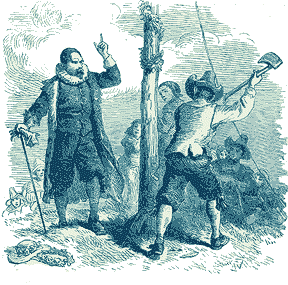Liberty, Current Events
Stop the OTHER War on May Day, Too!
The estimable Rod Long argues in an earlier post that we should stop the war on May Day by returning to its origins as a celebration of worker’s movements, rather than transforming it into a commemoration of the crimes of governments.
I’m more interested in the OTHER war on May Day.
Back in the century which I most often inhabit, May Day was about dancing, drinking, erecting ludicrously phallic May-poles, bedecking every bedamned thing in town with flowers, and sneaking off into the woods to have sex–for the sheer fun of it and for the added delight of really annoying the Puritans who hated the phallic symbolism, the pagan origins, the public intoxication, the illicit sex…and just about everything about May Day.

There shall be NO FUN around here.
WHERE, I ask you, has that May Day gone? There were still remnants of it when I was a kid. I remember making May baskets to take to my teachers. But I don’t think anyone even does that any more.
May Day was so important (and so viciously contested by English Puritans) that King James I and VI published a declaration in 1618 (republished by his son in 1633) to make his feelings about it clear. He wrote:
Our pleasure likewise is, that after the end of divine service our good people be not disturbed, letted or discouraged from any lawful recreation, such as dancing, either men or women; archery for men, leaping, vaulting, or any other such harmless recreation, nor from having of May-games, Whitsun-ales, and Morris-dances; and the setting up of May-poles and other sports therewith used: so as the same be had in due and convenient time, without impediment or neglect of divine service: and that women shall have leave to carry rushes to the church for the decorating of it, according to their old custom; but withal we do here account still as prohibited all unlawful games to be used upon Sundays only, as bear and bull-baitings, interludes, and at all times in the meaner sort of people by law prohibited, bowling.

Heaven only knows why the Puritans found this symbolism distressing.
I’m not sure why King James was so down on bowling, but I do know that May Day was so thoroughly embraced by the English people and the Church of England clergy that poet and clergyman Robert Herrick wrote one of his greatest poems in its honor. Corinna’s Going A-Maying is a joyous celebration of exactly the delights that King James’s declaration protects. The young lover even uses the declaration as a seduction technique. When he calls to Corinna to get out of bed and join him in the fields he says:
Come, we’ll abroad ; and let’s obey
The proclamation made for May :
And sin no more, as we have done, by staying ;
But, my Corinna, come, let’s go a-Maying.
Kisses and green-gowns (which the text coyly defines as “tumbles in the grass,” ahem) are being given all over town, argues Herrick’s young speaker. He and Corinna need to get going, or they’ll miss it all:
Come, let us go while we are in our prime ;
And take the harmless folly of the time.
We shall grow old apace, and die
Before we know our liberty.
How this lusty celebration became a time to debate worker’s rights, and then a time to celebrate the glories of an oppressive state and now, perhaps, a time to mourn those who suffered under the state, I am entirely unsure. I am sure, however, that we had a great holiday for celebrating pleasure and warm weather and sunshine and the sweets that come with freedom, and we blew it.
So If you’re looking for me today, I’ll be looking for something that needs a good floral bedecking.

